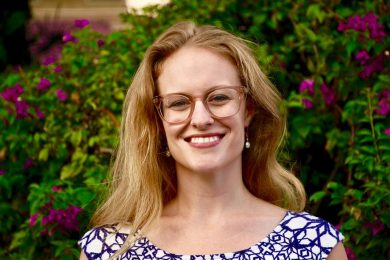
Piper Milton is a second-year PhD Student in the History program at UC Santa Cruz and the recipient of a 2019-2020 THI Summer Research Fellowship. Her work centers on the ways Catholicism was adapted and transformed during the colonial period in Central Mexico.
We spoke with Milton this week to learn more about her research and her summer trip to the Archivo General de la Nación in Mexico City. She also shared how her academic goals have shifted since arriving at UC Santa Cruz, and some tips for fellow students coping with the pandemic.
You were awarded a THI Summer Research Fellowship for your project: “Gender, Religion, and Race: Indigenous, Mixed-Race, and African-Descended Women in New Spain.” This sounds super interesting. Could you tell us non-historians what this project is about?
This project is about looking at the way indigenous, African-descended, and mixed-race women in colonial Mexico were viewed within legal, religious, and cultural frameworks.
This project is about looking at the way indigenous, African-descended, and mixed-race women in colonial Mexico were viewed within legal, religious, and cultural frameworks. For example, in what ways were enslaved and free women of African-descent engaging with policies enacted by the Catholic Church compared to indigenous women? What were these divisions like when issues like socio-economic class are then taken into consideration? Questions like that can try to help reconstruct some of the ways these communities were and were not integrated into the religious and cultural practices of colonial Mexico City on the basis of both gender and race.
What did you use the THI fellowship support towards over the summer? Any research trips or special projects?
I used my fellowship to support a research trip to Mexico City, in August 2019, to visit the Archivo General de la Nación. There I became registered as a researcher, and familiarized myself with their archival system and processes related to their collection of documents centered around religious issues during the sixteenth and seventeenth centuries.
How have your academic goals shifted since you arrived here at UC Santa Cruz?
I used my fellowship to support a research trip to Mexico City, in August 2019, to visit the Archivo General de la Nación.
My academic goals have shifted in that, as the program has progressed, my research interests have changed based on research and course material that I’ve been exposed to, the projects I’ve worked on with my advisors, and as my skills as a historian in terms of both research and writing have developed over time.
I am at the end of my second year here at UCSC, which means I’ll be finishing up my coursework next year and shifting my focus towards preparation for my qualifying exams next spring.
Can you tell us more about your research interests? What other areas, subjects, or time periods are you interested in beyond the one described above?
My research interests are mostly centered around the Spanish Empire from the sixteenth to eighteenth century. Last summer I completed a language intensive study on the indigenous Central Mexican language Nahuatl at the University of Utah on a Foreign Language and Area Studies (FLAS) Fellowship, which has helped me engage with new kinds of research from the colonial period. I am also interested in the history of the Catholic Church in early modern Europe and the Americas in general, specifically during the seventeenth century, and the ways changes and reforms within Catholicism were similar and different in places like the Iberian Peninsula versus Central Mexico.
What can you tell us about your time at UC Santa Cruz so far? Any highlights or challenges that you’d like to share?
My tip for fellow graduate students is to try and embrace the fact that your productivity will probably look and feel differently than it did before the pandemic and that’s okay.
A highlight so far has been being a part of a dynamic department with a lot of graduate students pursuing diverse research interests. My cohort has students studying so many different time periods and conducting research in so many different places—it’s nice to be a part of a community that supports a wide range of research topics.
Other highlights include being able to take courses in the History of Art and Visual Culture (HAVC) Department—my B.A. and M.A. are both in Art History and I was a lecturer in art history before coming back to school in 2018 to start my PhD, so it’s been fun to meet graduate students and faculty in the arts, as well as those in the Humanities and social sciences. In addition to the standard challenges of PhD programs, like time-management and balancing school and personal life, the biggest challenge is probably the fact that I am going to grad school in the midst of the COVID-19 pandemic!
Yes, this is a strange time to be studying and attending grad school! How has the pandemic changed the way you are thinking about your academic life and daily life right now? What do you do to try to stay focused and stay sane? If you have any tips for your fellow graduate students, we’d love to hear them.
The COVID-19 pandemic has been a stressful and challenging time to be a student or instructor of any kind, but I’ve been impressed with how everyone in my grad seminars has handled the transition to distance learning. My tip for fellow graduate students is to try and embrace the fact that your productivity will probably look and feel differently than it did before the pandemic and that’s okay.

Photo of Mab by Piper Milton
I also try to find humor wherever I can, since there is so much stressful news on a daily basis. One way working and taking classes from home has resulted in unexpected comedy is the fact that my elderly pug, Mab, frequently demands to be shown to my classmates via Zoom during seminars, so that’s a new problem to deal with that I obviously hadn’t encountered back when classes were in person!